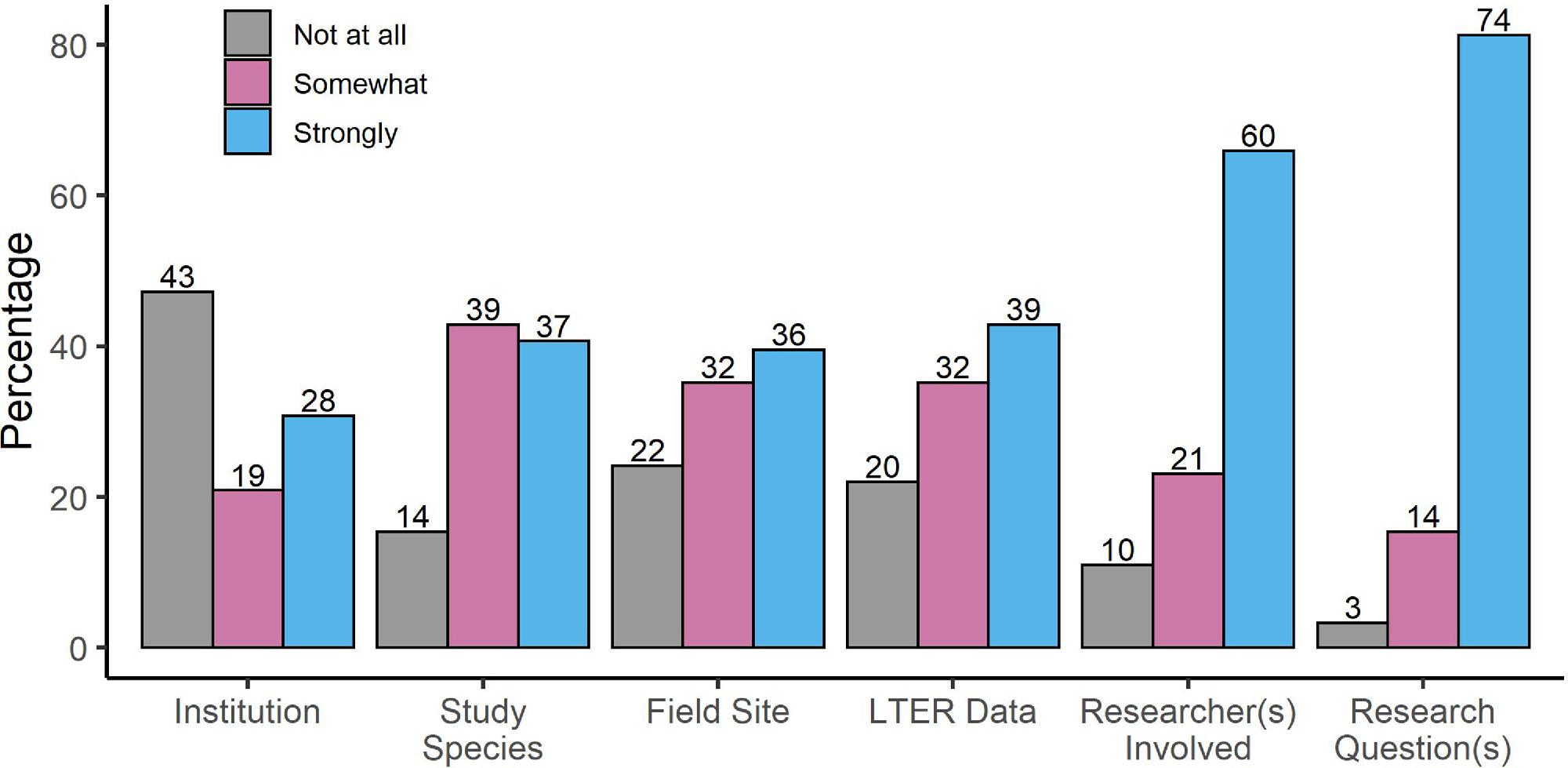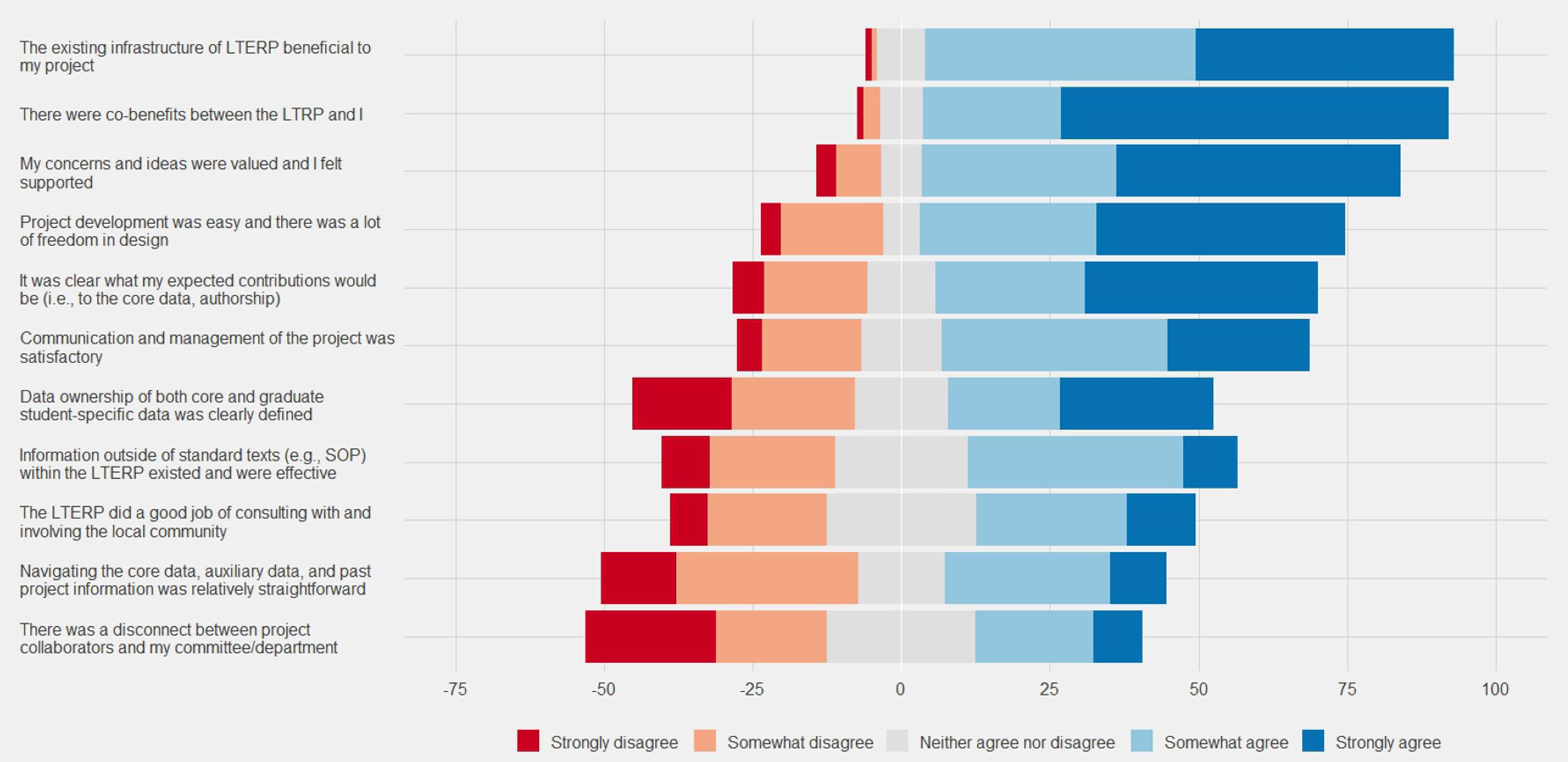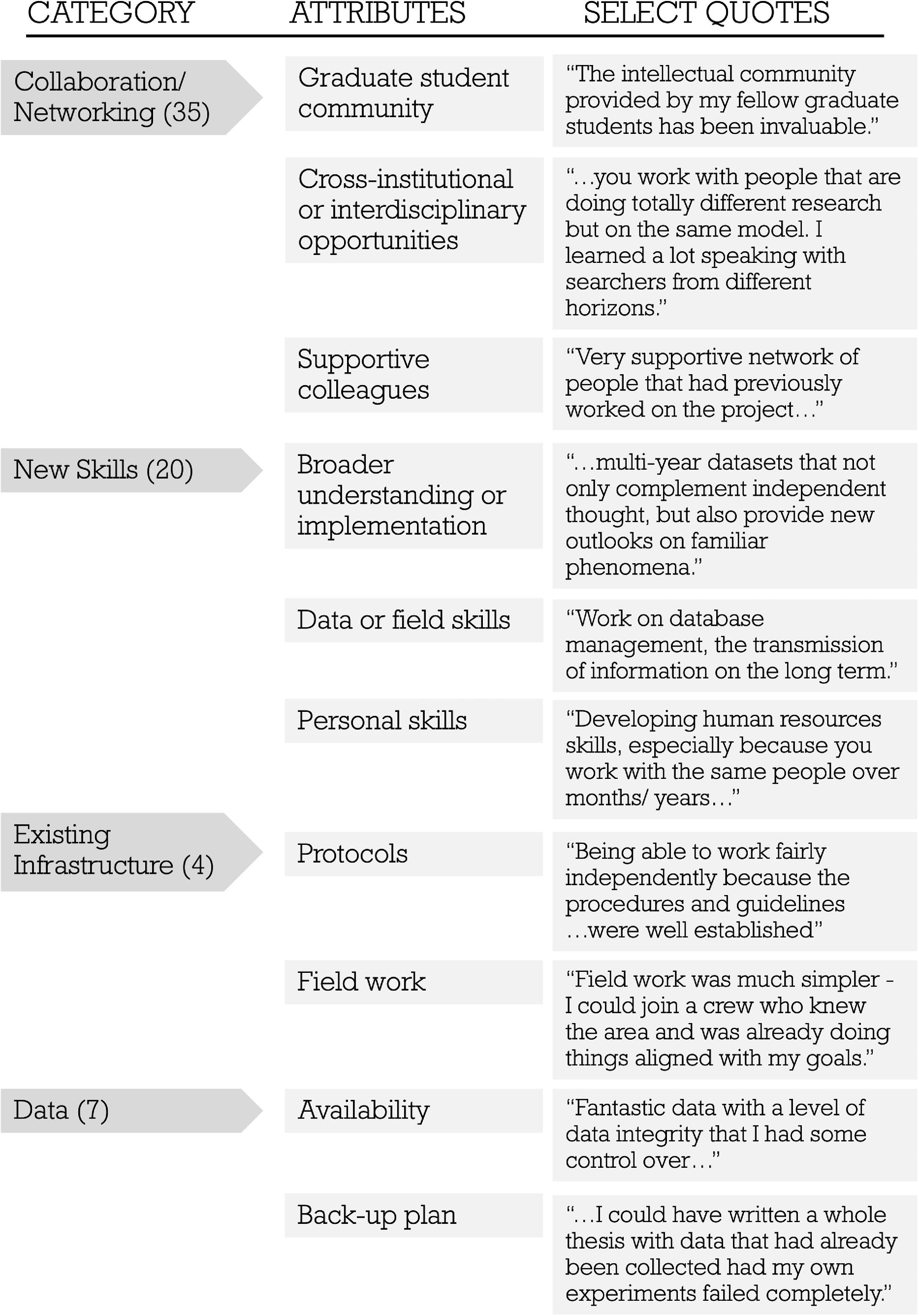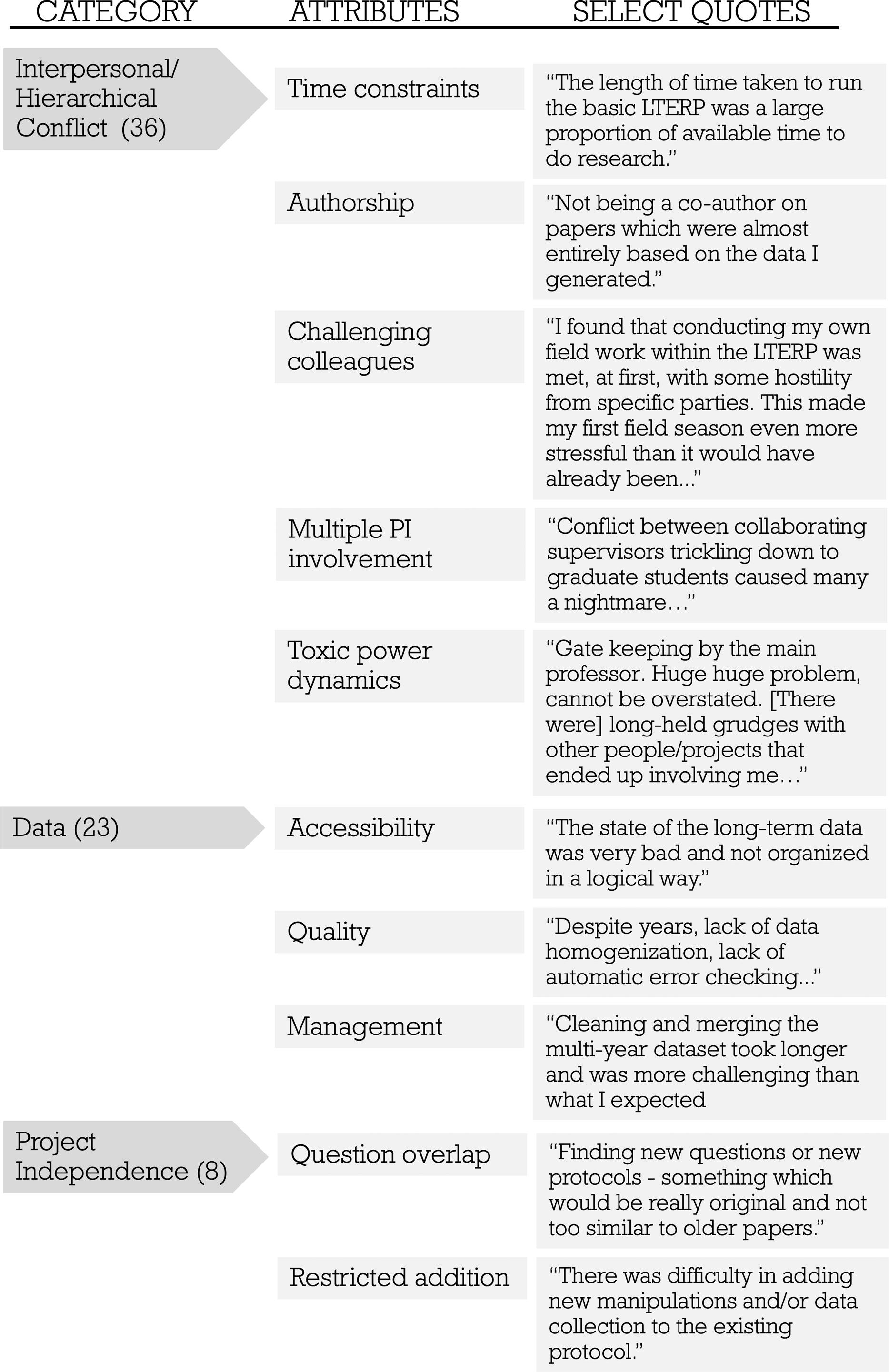Past studies have described the impact of LTER projects on the advancement of scientific knowledge (e.g.,
Clutton-Brock and Sheldon 2010) and the training of the next generation of biologists (
Waide and Kingsland 2021). Here, we explored the graduate student experience within LTER projects through survey results from 127 participants. On average, 76% of the survey was completed by participants (given they could skip questions). We were able to obtain a broad sample across current career stages (
n = 112 for this question) with 21 Master’s students (19%), 39 PhD students (35%), 21 postdoctoral fellows (19%), 16 professors (14%), four government agency scientists (<1%), and 11 people who worked outside academia or a government agency (1%). Our sample was also split across degree types performed in an LTER program, with 50% of the participants having conducted their PhD (
n = 55), 29% their Masters (
n = 32), and 22% both their Masters and PhD (
n = 24) in conjunction with a LTER project. Reliance on the LTER core project data (
n = 112) was also highly variable, with one third of graduate projects (
n = 38) relying completely on the LTER project data while 29%, 19%, 13%, and 4% relied only 75% (
n = 33), 50% (
n = 21), 25% (
n = 15), and 0% (
n = 5) on the data collected within the LTER project, respectively. Given that answers came from participants currently in various career stages and who conducted LTER research in different degree programs (Master’s and PhD) with variation in reliance on LTER data, we are confident we obtained a wide variety of experiences and believe their convergence on response categories adds weight to topic importance. Below, we discuss some of these major categories that emerged from our survey. Note that for the quotes, we have provided lightly copyedited text where necessary for clarity or to maintain anonymity while maintaining the original sentiment.
Motivations for joining LTER
We asked participants to rank the strength of influence of their motivations for choosing to work with a particular LTER project. The two strongest motivators were the potential research questions being addressed in the LTER and the researchers involved in the project, with 74% and 60% of participants, respectively, saying it strongly influenced their decision (
Fig. 1). Other project-related elements, including the long-term data, study species, and field site were identified as moderate motivators, with 39%, 37%, and 36% of participants, respectively, indicating these factors motivated their choice to join the LTER project (
Fig. 1). The institution affiliated with the LTER project did not motivate the decision for 63% of participants (
Fig. 1). Finally, six individuals chose “other” as a motivator, specifying availability of funding (
n = 3), the supervisor (
n = 2; e.g., “picked a PI at a great institution with funding”), or previous affiliation with the project (
n = 1) motivated their choice. As such, the reputation of the LTER project and the researchers involved were more influential than institutional or program choice, which should be noted both by researchers and by institutions themselves looking to recruit graduate students.
Benefits of conducting graduate research in an LTER project
Consistent with previous data and assertions in the literature (e.g.,
Gosz et al. 2010;
Waide and Kingsland 2021), we found the perceived benefits to be broad and numerous. Sentiments expressed through Likert questions were generally positive, indicating clear benefits to working within an LTER project (89% of participants agreed or strongly agreed that LTER participation is co-beneficial). These benefits included support in project development (72% agreed or strongly agreed), the existing infrastructure of the project (89% agreed or strongly agreed), and the built-in support system (i.e., participants felt valued and supported within the LTER project, with 81% agreeing or strongly agreeing;
Fig. 2). There was moderate agreement toward there being clear expectations for expected contributions toward data collection for core LTER project and publications (65% agree or strongly agree). We found moderate agreement for clear communication and management more generally (62% agreed or strongly agreed;
Fig. 2). This led to respondents being in favour of involvement with long-term research at a future stage of their career (88% agreed or strongly agreed) and participants generally felt like they would positively recommend LTER projects to other graduate students (87% agreed or strongly agreed;
Fig. 2; Supplementary materials). These sentiments confirm the perception that LTER projects act as training opportunities as claimed (
Gosz et al. 2010), and demonstrate that they are indeed experienced as such, and in a positive manner, by the trainees themselves.
The general benefits identified in the Likert questions also translated to our thematic analysis, where we identified four major categories of unexpected benefits participants (
n = 66) gained from working within an LTER project: (1) networking and collaboration (
n = 30), (2) developing new skills (
n = 23), (3) existing infrastructure (
n = 4), and (4) project data (
n = 7;
Fig. 3). Participants who indicated they benefited from collaboration and networking opportunities were the most prevalent (45% of responses) given they were able to work with a multitude of graduate students, institutions, or disciplines; there was a general sense of support and community arising from working within a collaborative network (
Fig. 3).
“I feel very fortunate to have taken part in a very long term [taxon] study. I felt tied to researchers who had been part of the study before me, and went on to work on other long term research studies partly because of this fact. It was good for my connections and network development, it was good for my understanding of an ecological system, and it was good for my thesis and development as a scientist".
“I am on the whole exceedingly lucky to have been steeped in a rich ecological history, which comes from the LTRP I am a part of. There are direct connections to fascinating lines of inquiry and a community of great support and caliber. All collaborations come at the cost of navigating difficult personality conflicts. But, that is a cost well worth the benefit of observing an ecosystem on a time scale greater than can be observed by one person alone”.
The development of new skills was the second most prevalent category (35% of responses), with skills acquired including conceptual skills related to perspective and thought within the field, technical skills related to fieldwork or data analysis, and personal skills such as interpersonal development, communication, and developing work-life balance (
Fig. 3). The benefits of existing infrastructure (6%) and long-term data (11%) were less prevalent thematically, but responses indicated that these benefits allowed participants to learn from established protocols and experienced people, and that data sample size and its utility as a back-up plan was useful in the event that there were failures with other aspects of the student’s project (
Fig. 3).
“It gave me a sense of security in the sense that I knew data already existed. It allowed me to concentrate more on the questions and the methods related to my project rather than worrying about data aresues”.
The above sentiments point to LTER programs offering a multitude of support systems, both in terms of personal support (e.g., mental health, networking, and skill sharing) and research support (through established protocols, infrastructure, datasets, and knowledgeable collaborators;
Waide and Kingsland 2021). It seems likely that these support systems contribute to the general feelings of positivity, and perhaps even augment mental health or provide a sense of security. Some sentiments under the skill acquisition category also imply that being a part of LTER may also produce researchers that have a broader foundation in the field; for example:
“…I believe LTERs promote a grander view of biological sciences among students. As opposed to thinking about research along a timeline of a handful of years (the life of a graduate project), students are encouraged to think far into the future, which stokes ambition for larger scientific ventures. This shift in perspective likely broadens the scope of questions they grapple with, and might aid in the transition to faculty positions which necessitate a comprehensive research plan that spans the duration of their academic career “.
Thus, the benefits of LTER participation for graduate students should not be understated, and LTER programs should aim to augment and strengthen the clear personal and research-based benefits that come as a result of being established and often collaborative programs.
Challenges in conducting graduate research with an LTER
Based on Likert questions, participants expressed a more negative outlook when it came to local community consultation (34%), navigating various forms of project data (e.g., core and auxiliary datasets; 37%), accessing information outside standard texts such as available protocols or publications (e.g., past research that did not yield a published paper; 46%), and data ownership (45%;
Fig. 2). While we tailored Likert questions to topics expected based on the literature and our own experiences, given the opportunity to expand in short answer questions (
n = 67), participants identified challenges within categories mostly focused on interpersonal conflict (
n = 36), with fewer related to data and project issues (
n = 23 and 8, respectively;
Fig. 4).
In text responses to the question asking what unexpected challenge was faced, interpersonal and/or hierarchical conflicts was the most prevalent category (54% of responses spoke about this issue). This main category was related to five sub-categories including (1) prioritization of core LTER project needs over individual graduate projects resulting in time constraints on independent graduate student work (
n = 6), (2) the exclusion from or granting of unjustifiable authorship (
n = 4), (3) dealing with challenging colleagues (
n = 5), and (4) navigating divergent priorities, poor communication, or the politics among multiple PIs (
n = 9;
Fig. 4). There were concerning responses from multiple participants who identified toxic power dynamics (
n = 4) related to territorial or gatekeeping behavior, sentiments which unfortunately are seen in science more broadly (
Fig. 4;
Tuma et al. 2021).
“Power dynamics are difficult to navigate. I am reluctant to visit one of the field sites because of an abusive personality. Managing a relationship with the field site has been challenging”.
The second most prevalent category had to do with data related challenges (34% of responses) with sub-categories related to: (1) accessing data, including lack of clear documentation on data collection and structure (
n = 10), (2) data quality, given the way the data were stored, collected by multiple people, or the lack of data cleaning (
n = 7), and (3) excessive time being spent on data management related to cleaning, manipulating, or merging various forms of the LTER datasets (
n = 6;
Fig. 4). Finally, project independence was the last major category to come out of respondent answers (12% of responses), which was also a challenge for some participants given they had a hard time coming up with new questions that were not already published (
n = 7), or had been answered in unpublished work that new students did not know existed (
n = 1;
Fig. 4).
When asked specifically about data related concerns, participants (
n = 66) primarily responded with concerns around data quality and consistency (
n = 29, 44%), with sub-categories arising from many different people collecting over the years (12%), and lack of standardized protocols or methodological creep over the length of the LTER project (24%;
Table 1). A second major concern was related to accessibility (
n = 17) through an inability to locate data or access data (53%), or lack of protocols and metadata to explain the data collection (29%;
Table 1). Finally, a less prevalent concern was related to long-term data ownership (
n = 10) given the efforts put into data collection (
Table 1). Only six of 66 participants had no data-related concerns.
When asked specifically about authorship related concerns, there were five major categories (
Table 1). Above all else, there was a call for clear guidelines to be established (
n = 18;
Table 1). In descending prevalence, participants also had inclusion-related concerns (
n = 18; i.e., lack of student inclusion and/or including others with questionable authorship merit), navigating the differing opinions of multiple PIs (
n = 3; i.e., through differing writing styles or ideas on project direction), overlap among publications due to multiple student involvement (
n = 2) and one instance of conflict of interest in publishing results not in line with what was desired by the funding body (
Table 1). Twenty-two of 66 participants had no authorship-related concerns, particularly when expectations were clearly set out ahead of time.
Some challenges identified here are certainly not unique to LTER projects. For example, the scientific literature is rife with examples of data-related calls for transparency and replicability across all fields (e.g.,
Baker 2016). Interpersonal and hierarchical conflicts are pervasive in the workforce in general and navigating such conflicts in an academic setting require skills that are not as prioritized in traditional natural science training (
Hund et al. 2018), such as mentorship, effective non-scientific communication, and conflict resolution. The scope of the remaining issues (data and authorship) have been discussed in terms of proper data archiving (
Mills et al. 2015;
Evans 2016), reproducibility (
Pace et al. 2019), and data preservation and rescue for future generations (e.g., the Canadian Institute of Ecology & Evolution’s Living Data Project;
Bledsoe et al. 2022). Additionally, authorship guidelines have been discussed in a general sense (Vancouver Convention, updated 2021), and more specifically for data contained in data repositories (
Wallis and Borgman 2011) and in relation to long-term projects (
Huang et al. 2020).
Potential benefit–challenge relationships
Further exploration of benefits and challenges within individual responses revealed emergent benefit–challenge pairs. Of the respondents who indicated collaboration and networking as a benefit, 16 identified interpersonal or hierarchical conflict as a challenge, 12 had data issues, and six had challenges with project independence. For example, one participant who identified “building a network of collaborators” as an unexpected benefit went on to identify an unexpected challenge being ‘integrating my ideas with other researchers on the project.” Another who developed “a strong international network with other researchers involved in long-term projects” encountered the challenge of “not being a co-author on papers which were almost entirely based on the data I generated”. It could be that collaboration and networking can lead to the stated challenges. For example, working in larger collaborative groups can lead to more interpersonal conflict (e.g.,
Müller 2012), project overlap among many students on the same long-term project, or issues with data when many people are contributing to the same dataset.
For the participants who identified an unexpected benefit related to skills, nine identified data as a challenge, followed by six with interpersonal or hierarchical conflict. The connection between skill development and encountering data challenges could be that overcoming data-related challenges necessitate technical skills development. For example, a participant who had the benefit of “being ‘gifted’ detailed and multi-year datasets” in turn “found [themselves] concerned with data quality”. Another possible connection may stem from participants valuing enhanced skills development above collaboration or networking. One participant felt “having to quickly get familiar on how to extract data and understand the whole process” was a benefit, yet found a challenge in “trying to understand how data was collected and processed in early years of the project”. Another found the existing database management and “transmission of information on the long term [project]” to be beneficial, but appeared frustrated by the “lack of automatic error checking, no shared R code”.
The difference in collaboration/interpersonal tendencies versus data-focused tendencies across questions may allude to different interests and values of graduate students coming into such projects, and perhaps different projects may attract or better serve different values. However, the degree of overlap among the benefits of collaboration, networking, and skills development with the challenges of interpersonal conflict and data could collectively be interpreted as a suite of characteristics of prevalent graduate student experiences in LTER projects. The framing of the questions leading to these responses as
unexpected challenges and benefits is important to be mindful of here, especially in relation to existing data, researchers involved, and possible research questions to be investigated as motivators to join a LTER project (
Fig. 1).
Study constraints and considerations
This study was designed to be exploratory in nature, casting a net for a range of respondents and investigating a wide scope in topics and questions, with the intention of identifying emerging categories and potential areas for improvement. We also aimed to center the experience of graduate students, both past and present. As such, we encourage our results to be interpreted as an important place from which to continue a conversation about the roles and responsibilities of participants in LTER, and how participation in LTER may be bolstered or hindered by current practices. While the survey received a relatively small number of responses, the emerging sentiments provide a valuable sketch of what researchers at the beginning of their careers are experiencing within well-established projects.
Looking forward, it is also important to consider the experiences and perspectives that are not included in this survey. The trade-off we faced between gathering more detailed participant data and the protection of participants, largely at a more vulnerable stage of their careers, meant that we were unable to explore the influence of demographics and/or identity on expressed graduate student experiences. The challenges faced by individuals in LTER frameworks may be further exacerbated for individuals in equity-seeking groups (
Tseng et al. 2020;
Duc Bo Massey et al. 2021). We encourage individuals involved in LTER projects, particularly those in leadership positions, to take steps to support safe and equitable research. For example, thoughts about gender breakdowns and mental health in LTER projects came out in the “Additional Comments” section of our survey:
“I encourage you to look at gender authorship breakdown as I suspect some LTERs are doing very poorly in this regard, despite, more or less, even ratios at the grad and tech level”.
“Perhaps not unexpected, but maintaining one's mental health can be particularly challenging in a remote environment in which you are expected (both explicitly and implicitly) to work long days, forgo regular days off, and constantly be positive/upbeat. Also, cabin fever is real, even when you spend all day in outdoor solitude”.
Without comparison to individuals in non-LTER programs, it is difficult to tease apart benefits and challenges that are unique to LTER, and what are typical of collaborative projects or even of graduate school in general. Indeed, some challenges acknowledged in discussions of LTER are not necessarily due to the structure of LTER projects themselves (e.g., fieldwork taking students away from campus;
Swank et al. 2001). Administering this survey to graduate students of ecological projects that are not considered “long-term” could reveal many similarities to perspectives expressed here. Regardless of whether challenges are unique to LTER or shared with scientific endeavors beyond LTER, these experiences are clearly occurring within LTER projects. Our results inform our objectives to explore experiences within LTER projects and identify key areas of strengths and improvement, regardless of the specificity to LTER. In this framing, many of the results of this study will be highly informative for a suite of research projects beyond the disciplines of ecology, evolution, and conservation, and beyond the temporal restrictions of being “long-term”.





